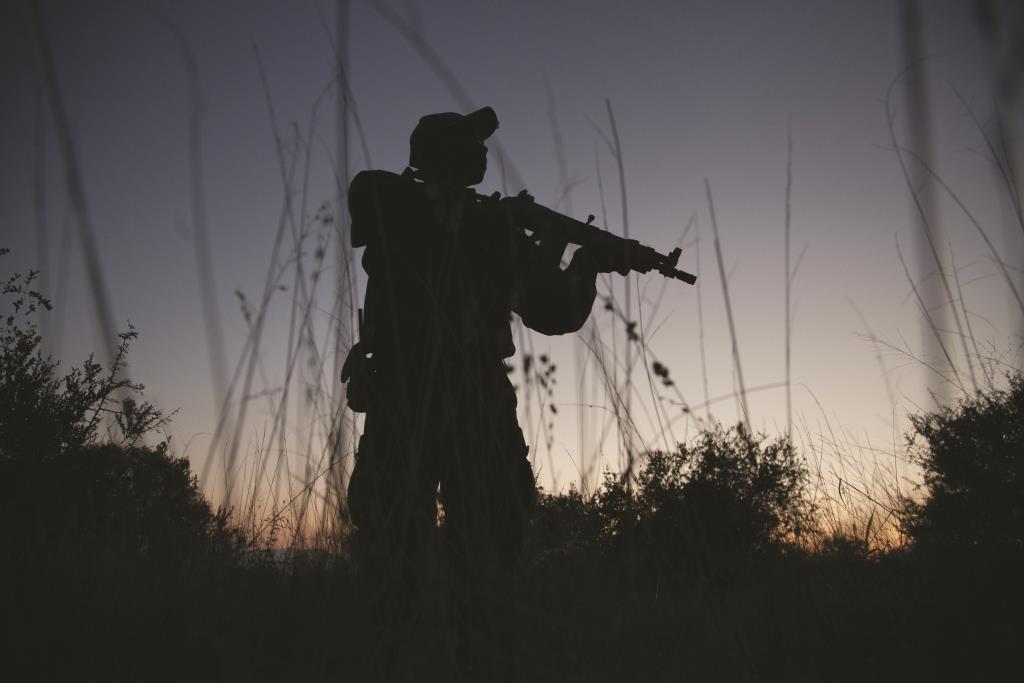It’s just before sunrise. All is still in the remote bushland, as the eight trainees line up. It’s cold this morning, you can see steam from their mouths as they yell “Yes sergeant” in unison. They are raw and it’s not quite the early morning they are used to.
This is the Black Mamba anti-poaching squad made up of five women and three men. They’ve been transferred from a private game farm in Hoedspruit, South Africa, to learn how to track down poachers as keenly as poachers hunt rhino.

One of the problems that has marred anti-poaching is the lack of professionalism and bite. Now private companies like Protrack are being brought in to sharpen up the thin line that stands between rhinos and extinction. Leading the stage is Vincent Barkas, a former soldier in the South African army, who spent years fighting border wars near the Zimbabwean border.
“Everything is intelligence driven and crime prevention now. Your tracking is still very important but you don’t need the world’s greatest tracker to catch these people. It’s all about area coverage. We lost more rhino in 2011 than we did in the past 25 years. Of those 16 that were poached, 12 were on unprotected farms. They were targeting the softer animals. In 2012, we got it down to 11,” says Barkas.
According to Barkas, he thinks it has been too easy to become a guard. All you have to do is a weapons and self-defense course. He believes it’s time to up the ante as the game gains momentum. It’s no longer a case of tracking a poacher in the bush, you have to stop them before they can get the rhino horn out.
“With the rhino poachers now, whether they have shot the rhino or not, they are normally in a vehicle within an hour on a government road. Within five hours they are in Jo’burg,” he says.
In the beginning, all Barkas’ group needed was a single-shot shotgun to protect their farms. Poaching began to escalate in 1997 and the company forked out half a million rand on semi-automatic rifles and began training.
“In 1992, in the private sector of anti-poaching, your average anti-rhino poaching guy was a black man, that was paid R250 ($25) a month, given primitive accommodation and a bag of mielie meal,” he says.
Now things are different. It costs R20,000 ($2,000) a month to have one unit, working as a two-man team, on the ground. Most people who try, can’t cut it.
“For every hundred people you train, if twenty of them can become game guards then you are doing good,” he says.
It’s a dangerous job. The number one rule in the bush is that you are never safe. Last year, a lion killed a sleeping anti-poacher by dragging him out of a makeshift boma.
Full moons are the worst. Twenty people, armed and organized, can jump the fence of the Kruger National Park on these nights, says Barkas.
“As the Kruger starts sorting themselves out, the real men are going to come around and we are not ready for that. There is still a huge amount of farms in the private sector that have no guards or properly trained guards,” he says.
The anti-poaching movement is trying to stamp out rhino poaching but it’s difficult in a land of very rich and very poor.
“If you drive down certain roads that border the former homelands you’ve got game farms on this side, which are just wealth green trees and wildlife lodges, and then you have got poverty,” he says.
Most of the communities in the surrounding areas of big game farms live in poverty. For them it is hunting. Many consider the farms as rich white-owned locations to be used to feed families.
People living here know who the poachers are but fear retribution. When poachers are caught many walk because police are slow to follow up.
Although rhino-based cases have seen conviction, a key prevention is catching poachers before they kill. Secrecy is as important as guns. Anti-poachers will spend 10 days in the bush on patrol. The spread of patrols is so wide, most never see another unit.
The foot soldiers in the war against rhino poaching have to risk their lives every night, especially when the moon shines. Often all they have is blisters to show for it. It’s an unsung job but without the rhino crusader, the rhino could be wiped off the face of
Africa.
